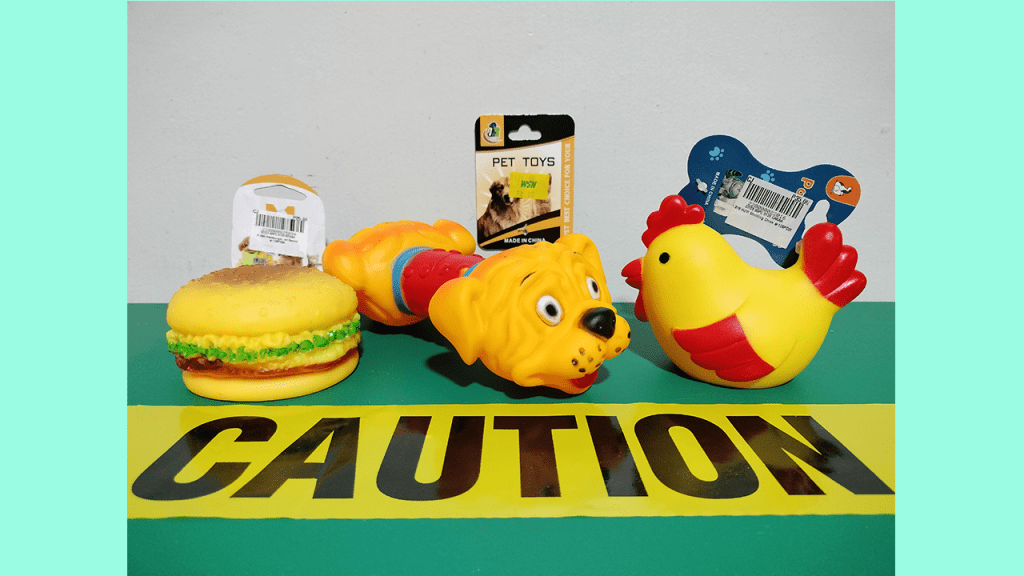


The EcoWaste Coalition has discovered elevated levels of toxic phthalates (pronounced THAL-ates) in soft plastic toys for cats and dogs. These health-damaging chemicals have long been prohibited in children’s toys and childcare articles, but are not regulated in pet toys.
For starters, phthalates refer to a group of synthetic chemicals that are added to polyvinyl chloride (PVC) plastic to make it soft and pliable, reduce brittleness, and improve durability. Six specific phthalates (namely DEHP, DBP, BBP, DINP, DIDP and DnOP) are prohibited in children’s toys and childcare articles at levels exceeding 0.1 percent or 1,000 parts per million (ppm).
Based on the market investigation conducted by the EcoWaste Coalition, 33 out of 50 pet toy samples purchased are made of PVC plastic. The group obtained the samples from online sellers and from pet shops and toy stores in Caloocan, Makati, Malabon, Mandaluyong, Manila, Pasay, Pasig, Quezon and Taguig Cities. Like most children’s toys, the sampled pet toys were found inadequately labeled, lacking basic information about the product manufacturer, importer or distributor; country of production; usage instructions; hazard warnings; precautionary statements, etc.
The group decided to have some of the PVC pet toys analyzed for phthalate content. As the cost of phthalate analysis is quite steep, the group only managed to get three pet toys examined by SGS, a global testing company.
According to the test results, the three analyzed pet toys contained very high levels of phthalates surpassing the 1,000 ppm limit. The squeaky burger toy tested with 142,000 ppm DBP and 35,800 ppm DBP. The squeaky dog toy had 372,000 ppm DEHP (a probable human carcinogen). The squeaky chicken toy contained 98,400 ppm DBP and 206,000 ppm DEHP. The dog toy and chicken toy were both marked “made in China” (the burger toy provided no information about its country of manufacture).
“We see no reason why the quality and safety of pet toys should not be checked and regulated. As pet toys could be used by kids, especially the cute squeaky ones, we find it important for such play things to be free of hazardous substances such as phthalates and other endocrine disrupting chemicals (EDCs),” said Aileen Lucero, National Coordinator, EcoWaste Coalition. “Our fur-kids deserve toys that pose no health risks for them and for our children, too.”
“Pet toys should be as safe as toys for children because pets are part of our family. It is unacceptable that toys that will not be subjected to safety standards for the mere reason that they are for animals,” said Anna Cabrera, Executive Director, Philippine Animal Welfare Society (PAWS). “Due to the relationship of companion animals and human beings, whatever toxins there are on pet toys are also coming into contact with human fur-parents and the children.”
Studies in animals and humans have linked phthalates, which are known EDCs, to a host of health issues, including diabetes, obesity, asthma, heart disease, low IQ, reproductive disorders, cancer of the breast, attention-deficit/hyperactivity disorder (ADHD) and other behavioral problems.
In Denmark, a study by researchers at the Danish Institute for Food and Veterinary Research about chemicals in cat and dog toys sold in the local market and on the Internet showed toys made of PVC contained large amounts of DEHP and DINP. “The exposure via toys may be a major source of phthalate exposure to dogs,” the study said.
“However as for humans, animals may also be exposed to phthalates via other sources (environment, food, consumer products). This includes exposure to DEHP and DINP, but also other phthalates e.g DBP where combined actions could be expected.” Animal owners were advised to reduce pets’ usage of such toys particularly during pregnancy and in case of little puppies.
-end-
Additional Information:
1.Department of Health (DOH) Administrative Order No. 2009-0005-A as amended in 2011 makes it unlawful for any person to manufacture for sale, offer for sale, distribute in commerce, or import into the country any children’s toy that contains concentrations of more than 0.1 percent of di-(2-ethylhexyl) phthalate (DEHP), dibutyl phthalate (DBP) or benzyl butyl phthalate (BBP). It further disallows toys that can be placed in a child’s mouth that contain more than 0.1 percent of diisononyl phthalate (DINP), diisodecyl phthalate (DIDP) or di-n-octyl phthalate (DnOP).
Source:
https://www.fda.gov.ph/wp-content/uploads/2021/05/Administrative-Order-No.-2009-0005-A.pdf
- “Evaluation of the Health Risk to Animals Playing with Phthalate Containing Toys,” Department of Toxicology and Risk Assessment, Danish Institute for Food and Veterinary Research
Source:
https://www2.mst.dk/udgiv/publications/2006/87-7052-192-1/pdf/87-7052-194-8.pdf
EcoWaste Coalition
78-A Masigla Extension, Barangay Central, 1100 Quezon City, Philippines
Phone: +632-82944807 E-Mail: info@ecowastecoalition.org
Website: http://ecowastecoalition.blogspot.com




![[Campaign] Call for Donations: Free our environmental and community defenders in Dupax del Nortw | ATM](https://hronlineph.com/wp-content/uploads/2026/01/fb_img_1769411733818.jpg?w=1024)
![[Statement] Free Dupax del Norte 7! Defend Dupax del Norte! Defend the Future! | AMKP](https://hronlineph.com/wp-content/uploads/2026/01/fb_img_1769349155125.jpg?w=1024)
![[Statement] A Solidarity Statement On the Enforcement of the Writ of Preliminary Injunction in Dupax del Norte, Nueva Vizcaya | CMSP-JPICC and Mission Partners](https://hronlineph.com/wp-content/uploads/2026/01/fb_img_1769347777519.jpg?w=1024)
![[Press Release] Sibuyan residents reiterate demand to cancel Altai’s mining contract](https://hronlineph.com/wp-content/uploads/2026/01/fb_img_1769151031207.jpg?w=1024)
Leave a comment